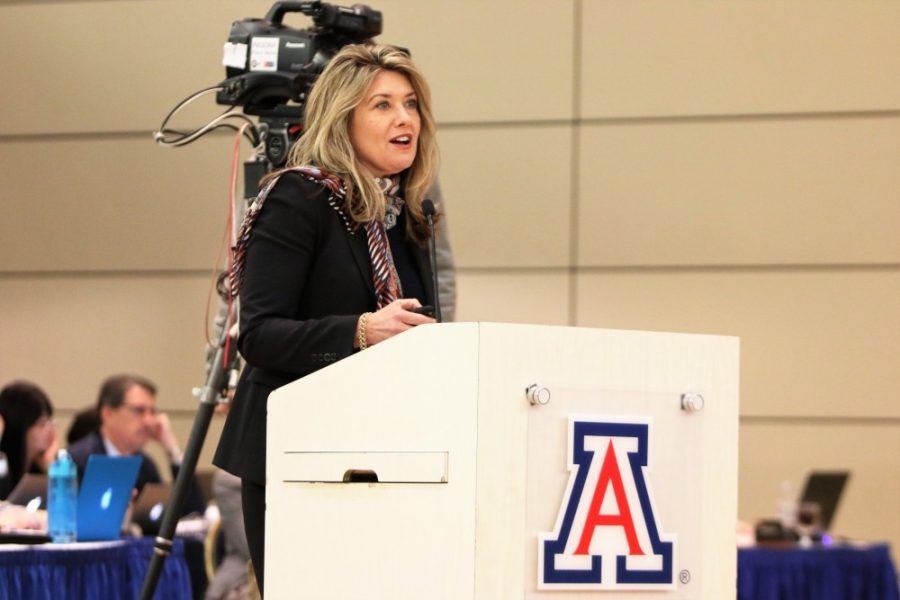The Arizona Board of Regents voted unanimously to support Gov. Doug Ducey’s state budget on Jan. 20.
“Governor Ducey’s fiscal year 2018 budget provides needed support to our public universities and the students we serve,” said regents President Eileen Klein, in a Jan. 12 press release.
Ducey’s budget proposes to exempt Arizona’s public universities from sales tax.
The estimated $37 million previously paid in sales taxes will be used to finance the borrowing of up to $1 billion for the next 30 years.
During a regents meeting held last year at the UA, Tom Belshe, Deputy Director for the League of Arizona Cities and Towns, spoke out against this proposal. The cities containing the three public universities are expected to lose about $7 million in revenue as a result.
“I do want to express concern and sentiment for the local municipalities that would see a real decline in their resources, but I think that it is important for us to continue that discussion,” said Rita Cheng, NAU president, after the measure was tabled for further discussion by the regents.
“Our view is that revenue can be enhanced by our state universities. One of the constraints on economic development will be adequate, trained workforce,” said Regent Rick Myers.
Myers understands the need to fix potholes within the next few years, but the economic output generated by a university with more capital to invest will result in a city budget with little damage.
The UA currently has $131 million in deferred maintenance costs according to Gregg Goldman, senior vice president for business affairs and UA CFO. By 2025, the UA will need an estimated $1 billion to resolve deferred maintenance.
The bonds sold based on the guaranteed sales tax income will fund deferred infrastructure maintenance as described by Goldman.
“If we don’t build research facilities, if we don’t maintain research facilities, we’re not going to be able to move forward,” Goldman told the regents.
RELATED: UA maintains $131 million in deferred maintenance of old buildings
The debt will also fund new construction projects, the improvement of research facilities and free up funding previously used to secure loans.
“If we build research facilities, we know they’re going to be filled with great research that will bring in more funding.” Myers said during the UA’s regents meeting. “These aren’t risky bets.”
The budget provides a one-time $15 million appropriation which the public universities can spend at their own discretion. The UA will receive around $4.2 million based on the size of its student population in relation to ASU and NAU.
“Not only will students benefit from this effort, but so will Arizona’s economy as this bonding allows Arizona State University, Northern Arizona University and the University of Arizona to become even bigger economic drivers of research and development,” said Chair Greg Patterson, during the regent’s Jan. 20 special meeting.

Since the recession, $99 million has been cut from schools. Ducey’s budget does not contain any plans to restore any previous basic state aid.
“The funding Ducey’s budget describes for education is in name only because the numbers are so small compared to the losses and cuts that have been made to the universities over the last 10 years,” said Jo Holt, chair of the Pima County Democratic Party.
“My budget responsibly utilizes the resources we have available to invest in education and expand opportunities for everyone in our state, including our most vulnerable citizens,” Ducey said in a press release.
According to Ducey, his budget invests $114 million beyond inflation and enrollment growth on K-12 education.
“We are on firm financial footing and have the ability to invest real dollars in areas where they matter,” Ducey said.
Ducey’s budget promises an average $900 raise of Arizona teachers by 2022. The budget provides $13.6 million this year, equating to an average reward of $225 for each teacher.
RELATED: UA and regents make funding, tuition primary focus of state legislative session
Poor neighborhoods will receive $10 million to fund full-day kindergarten programs. If 60 percent of students at a school qualify for free or reduced lunch, teachers choosing to move to these schools will receive a $1,000 bonus.
An additional $250,000 will be appropriated to relieve math, science and special education teachers’ debts.
Schools with an average AzMERIT score in the top 10th percentile in the state will share in an allotted $38 million of bonuses; schools with lower income students will receive a greater proportion.
School construction and repair will receive $17 million from Ducey’s budget. Private contractors will be compensated, from the new budget, in order to increase their workers pay to meet new minimum wage requirements.
Broadband internet will be brought to rural and low-income schools to the tune of $5 billion.
During the regent’s Jan. 20 meeting, the regents reaffirmed their commitment to lobby the state legislature to fund half of in-state residents’ tuition by 2020.
Currently, the state funds 34.5 percent of in-state tuition. The regents received an additional $62.8 million from private donors beyond Ducey’s budget in order to increase tuition coverage to 40 percent.
Follow Randall Eck on Twitter.








